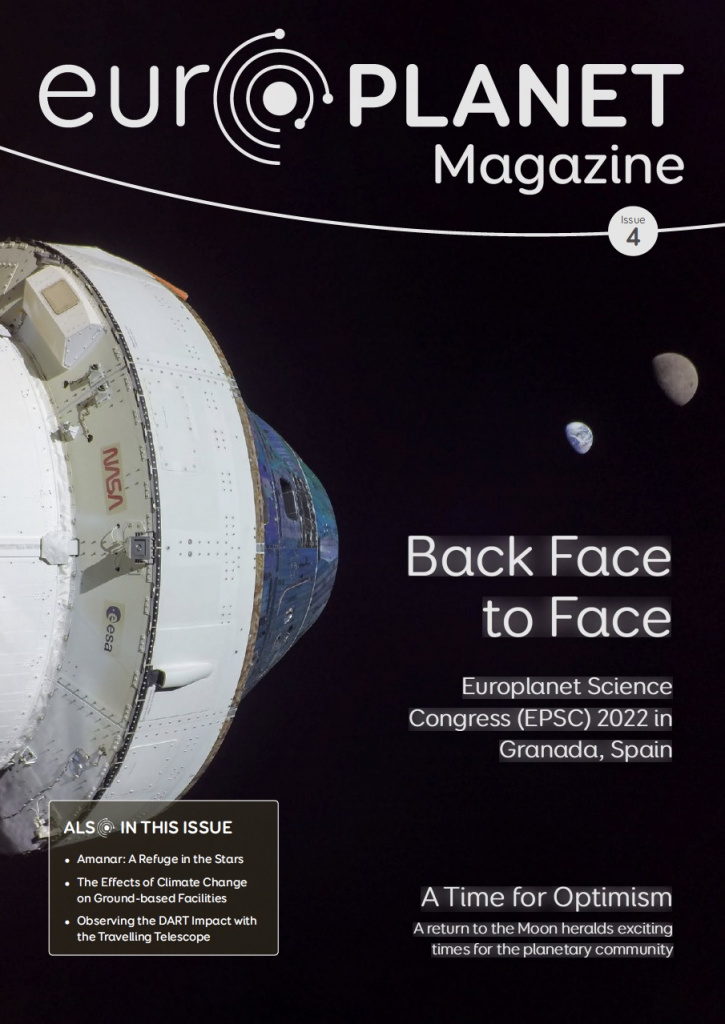Issue 4 of the Europlanet Magazine is out now!
In this issue:
In Focus
A round up of news from Europlanet 2024 RI, the Europlanet Society, the Europlanet Science Congress (EPSC) 2022 and the planetary community.
Back Face to Face
For the first time in three years, the planetary science community had the opportunity to meet face-to-face at the Europlanet Science Congress (EPSC) 2022 in Granada, Spain. Thibaut Roger (Europlanet/Universität Bern/NCCR PlanetS) and Vix Southgate (Europlanet/Vixen Design) present a selection of EPSC2022 images.
Planetary Perspectives
Ann Carine Vandaele, the new President Elect of the Europlanet Society and Head of the Planetary Atmospheres Group at the Royal Belgian Institute for Space Aeronomy (IASB-BIRA), talks about her career and her vision for Europlanet in this month’s Planetary Perspectives Q&A.
Amanar: A Refuge in the Stars
Felipe Carrelli, Jorge Rivero González, Andrea Rodríguez Antón, Nayra Rodríguez Eugenio and Diego Torres Machado on behalf of GalileoMobile and the Amanar Task Force explain how the ‘Amanar: Under the Same Sky’ project is using astronomy to support Sahrawi refugee communities through skills development and self-empowerment activities.
The Effects of Climate Change on Astronomical Observing Facilities
Caroline Haslebacher (University of Bern/NCCR PlanetS) and her team look into how climate change will affect ground-based observations.
Observing DART with the Travelling Telescope
Colin Clarke of Armagh Observatory and Planetarium in Northern Ireland visited the Travelling Telescope Team in Kenya through the Europlanet Expert Exchange Programme.
VESPA Comes of Age
Stéphane Erard (Observatoire de Paris) explores the evolution of Europlanet’s virtual access service, VESPA.
Long-term Sustainability of Small and Mid-scale Distributed RI Projects
Liliana Avila Ospina and Patrick England (MOSBRI), Ana Helman (ESF), and Anita Heward and Nigel Mason (Europlanet) report on a side event session at the International Conference of Research Infrastructures (ICRI) 2022.
Europlanet Impact Case study: Atomki
Béla Sulik explains how the Institute for Nuclear Research (Atomki), Hungary’s national centre of accelerator-based nuclear and atomic physics, became involved with and has benefitted from collaboration with Europlanet.
JWST Sees Red with First Pictures of Mars
Sanje Fenkart, a science communicator and freelance journalist, is the new editorial assistant for the CERNCourier. She took part in the media internship programme at the Europlanet Science Congress (EPSC) from 18-23 September 2022 funded by the Europlanet 2024 Research Infrastructure (RI) project. Here she reports on results presented at the meeting.
From Online to Granada: Bringing Scientific Conferences to Schools
Ulysse Pedreira-Segade, Education Officer for Europlanet 2024 RI and Scientific Coordinator for Lecturers Without Borders, describes how activities to bring planetary sciences to the classroom has transitioned from online to in-person.
Status of Women in Astronomy: Still a Long Way to Go
Mamta Pommier (LUMP/CNRS, Université de Montpellier, France) and Arianna Piccialli (Royal Belgium Institute of Space Aeronomy, Belgium), on behalf of the IAU Women in Astronomy Working Group, take a first look at factors suppressing the careers of women astronomers around the world.
Hidden in the Noise
Yoshifumi Futaana (Swedish Institute of Space Physics) shows how asking unusual questions can lead to ground-breaking science.
CommKit
The Europlanet Magazine’s column on science communication by Thibaut Roger (Europlanet/Universität Bern/NCCR PlanetS) reflects on unconventional outreach practices.
The Last Word – A Time for Optimism
Nigel Mason (University of Kent/Atomki) reflects on positive news for the planetary science community.


